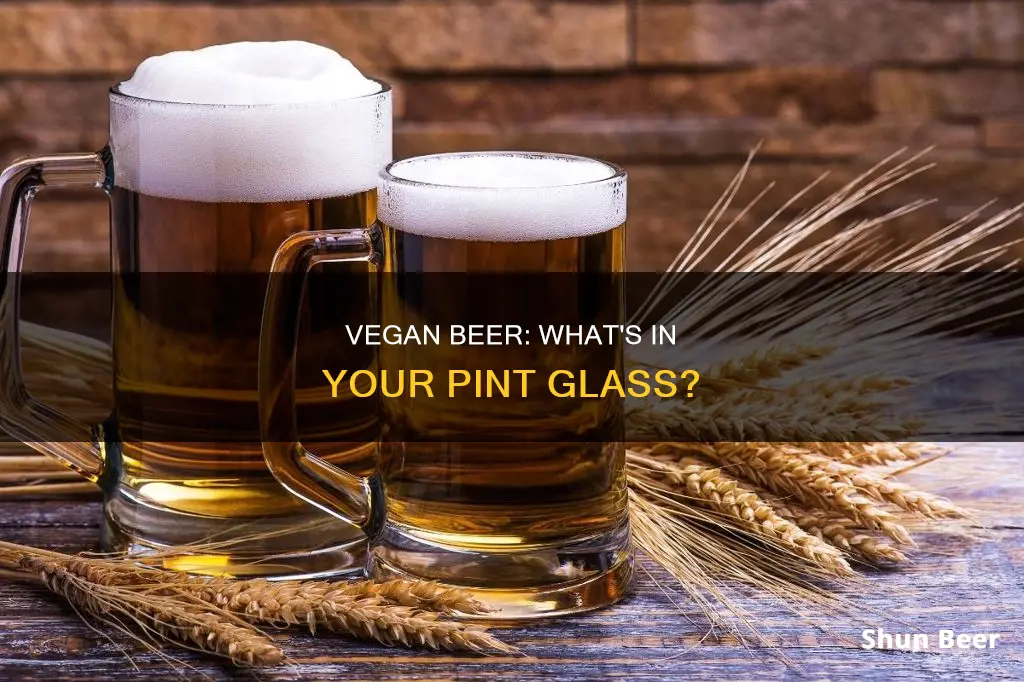
Beer is typically made from barley malt, water, hops, and yeast, which are all vegan ingredients. However, some brewers add finings, or clarifying agents, that are derived from animal products, such as isinglass (from fish bladders), gelatin (from animal bones and skin), glycerin (from animal or plant sources), and casein (from milk). These additional ingredients mean that some beers are not suitable for vegans. It can be challenging to identify which beers are vegan as manufacturers are not required to list ingredients on beer labels. However, resources like Barnivore provide lists of vegan-friendly alcoholic drinks, and some beers may display vegan symbols on their packaging.
| Characteristics | Values |
|---|---|
| Core ingredients | Barley malt, water, hops, yeast |
| Specialist ingredients | Oats, rye, wheat |
| Non-vegan additives | Lactose, isinglass, gelatin, glycerin, casein, honey, eggs, milk |
| Vegan beers | Budweiser, Bud Light, Coors, Coors Light, Corona Extra, Corona Light, Miller Genuine Draft, Miller High Life, Guinness Draught, Guinness Original XX, Sam Smith's beers (except Yorkshire Stingo and Old Brewery Bitter), Carlsberg, Carlsberg Light, Boddingtons, Stella Artois, Sappora, Kirin, Asahi, Sam Adams Boston Lager, City Steam Colt Lager, Pabst Blue Ribbon, Pilsner Urquell, Bernard, Budějovický Budvar, Heineken, Kronenbourg |
What You'll Learn
- Non-vegan additives like lactose, milk, cream, and honey are added for flavour and body
- Clarifying agents derived from animal products, like isinglass, are used in the fining process
- Beer finings are made from isinglass, which is made from the dried swim bladder of sturgeon and other fish
- Beer can be clarified using plant-based finings like Irish moss, a type of carrageenan seaweed
- Beers like oyster, cream, and milk stouts contain animal-derived ingredients

Non-vegan additives like lactose, milk, cream, and honey are added for flavour and body
Beer is typically made from barley malt, water, hops, and yeast, which are all vegan ingredients. However, some brewers add non-vegan additives, such as lactose, milk, cream, and honey, to enhance the flavour and body of the beer. These additives are not always clearly listed on the beer labels, so vegans need to be cautious when selecting beers.
Lactose, a sugar derived from cow's milk, is often added to milk stouts, low-alcohol, and non-alcoholic beers to add body and mouthfeel, mimicking the experience of higher-alcohol content beers. Lactose is also found in some "smoothie" beers. Milk and cream are added to beer and liqueurs to impart a creamy, rich flavour and are also used in cocktails and blended drinks. Honey, stolen from bees intended for their hives, is used as a sweetener in some beers, such as honey beers, and other alcoholic beverages. These non-vegan additives are included in the beer-making process to cater to specific styles and tastes, but they render the beer unsuitable for those following a vegan lifestyle.
It is important to note that some beers also use animal-based fining agents, such as isinglass (made from fish bladders) and gelatin (derived from animal skin, bones, and cartilage), during the brewing process. These finings are added to clarify the beer and improve its appearance, but they are not essential to brewing good-tasting beer.
To ensure that the beer they consume is vegan, individuals can refer to online resources like Barnivore, which provides information on the vegan status of various alcoholic beverages. They can also look for vegan symbols or text on the product labels or contact the manufacturer directly to inquire about the ingredients used.
Beer and Running: What's the Deal?
You may want to see also

Clarifying agents derived from animal products, like isinglass, are used in the fining process
Beer is mostly vegan, as its core ingredients—malted barley, yeast, hops, and water—are plant-based. However, some beers are clarified using animal products, making them non-vegan.
Clarifying agents, also known as finings, are substances used to help achieve clarity in beer by removing unwanted particles and haze. This process, called fining, is not essential to brewing good beer, but it is done to meet modern aesthetic expectations of crystal-clear beer.
Some finings are derived from animal products, such as isinglass, which is made from the dried swim bladders of sturgeon and other fish. Isinglass is added to the beer to attract haze-forming particles, causing them to settle out of the beer more quickly. The beer is then drawn off, leaving the finings and unwanted solids behind.
Other animal-derived fining agents include gelatin, egg whites, blood, and milk. These finings are added to the beer at or near the completion of processing, and they are later discarded along with the compounds they capture.
It is important to note that not all finings are animal-based. Modern alternatives include bentonite, carrageenan, alginate, diatomaceous earth, silica gel, and various plant-based proteins. These vegan-friendly finings can be used to achieve the same level of clarity in beer without the use of animal products.
Beer and Angioplasty: What You Need to Know
You may want to see also

Beer finings are made from isinglass, which is made from the dried swim bladder of sturgeon and other fish
Beer is usually vegan, but not always. While the core ingredients of beer are plant-based, animal-based materials may be used in the creation of beer. One such animal product is isinglass, a traditional fining agent derived from the swim bladders of certain tropical and subtropical fish, including sturgeon. The swim bladders are dried and dissolved for several weeks in dilute food-grade acids, forming a turbid, colorless, viscous solution largely made up of the protein collagen. This collagen in isinglass is a highly ordered, positively charged helical polymer that can be used to settle yeast and beer proteins very quickly and repeatedly. This property is especially useful for cask-conditioned ales, where the casks may be moved several times before serving.
Isinglass is added to beer after fermentation is complete, and it is often added directly to casks in the pub cellar. While in theory, all of the isinglass should settle out of the beer before it is served, this is not guaranteed. The very fact that fining with isinglass is not an essential part of brewing good beer may be a reason for vegans to avoid it. The purpose of fining beer is for appearance alone, and in most cases, it does not significantly influence the taste. There are alternative methods to achieve clear beer without the use of animal products, such as using plant-based finings like Irish moss, a type of carrageenan seaweed, or silicated or vegan finings.
The Beer Droid: Brewing Process Decoded
You may want to see also

Beer can be clarified using plant-based finings like Irish moss, a type of carrageenan seaweed
Beer is usually vegan-friendly, but some are made using animal-derived ingredients. One such ingredient is isinglass, a fining agent derived from the dried swim bladders of sturgeon and other fish, which is added to the beer to help clarify it.
However, there are plant-based alternatives to isinglass, such as Irish moss, a type of carrageenan seaweed. Irish moss is a fining agent that can be added to the boil to promote clarity in the beer. It is typically added within the last 15 to 20 minutes of the boil, with a ratio of one teaspoon per five gallons of beer.
Carrageenan, the main component of Irish moss, has a negative electrostatic charge. This causes it to attract the positively charged protein clumps from the boiling wort's hot break, forming larger clumps that precipitate out of suspension faster. These clumps will not make it into the fermenter, resulting in a clear beer without the need for filtration.
Other plant-based fining agents used in vegan beer production include silicated or vegan finings, which are added after fermentation, and clay-based fining agents like bentonite.
Beer Towers: How Do They Work?
You may want to see also

Beers like oyster, cream, and milk stouts contain animal-derived ingredients
Lactose is not the only animal-derived ingredient that can be found in beers. Beer finings, or clarifying agents, derived from animal products are sometimes added to the brewing process. Isinglass, a common fining agent, is made from the dried swim bladders of sturgeon and other fish. While the finings are meant to settle out of the beer before bottling, it is not guaranteed, and the beer cannot be considered vegan.
Other animal-derived fining agents include gelatin and egg, although these are more commonly used in wine production. These fining agents are used to improve the clarity, flavor, and aroma of the beer. While the purpose of fining is solely for appearance, and it typically does not significantly influence the taste, it is still an important consideration for those following a vegan lifestyle.
It is worth noting that some breweries create vegan beers that mimic the styles of oyster, cream, and milk stouts without using animal-derived ingredients. These beers use vegan-friendly substitutes, ensuring that their products are suitable for those following a vegan diet or lifestyle.
Beer Connoisseurs Explore 20% Alcohol Brews: Safe to Drink?
You may want to see also
Frequently asked questions
Yes, vegans can drink beer, but they should be careful to check the ingredient list on the beer bottle to confirm that the drink does not contain non-vegan ingredients.
Common non-vegan fining agents used in beer include isinglass, gelatin, glycerine, and casein. Other non-vegan ingredients include egg whites, milk, and honey.
If you are unsure whether a beer is vegan, you can check the ingredients list on the bottle or packaging. You can also contact the manufacturer directly to ask if they have any vegan offerings. There are also online resources, such as Barnivore, which list vegan-friendly alcoholic drinks.
Some popular vegan beers include Budweiser, Coors, Carlsberg, and Guinness.







